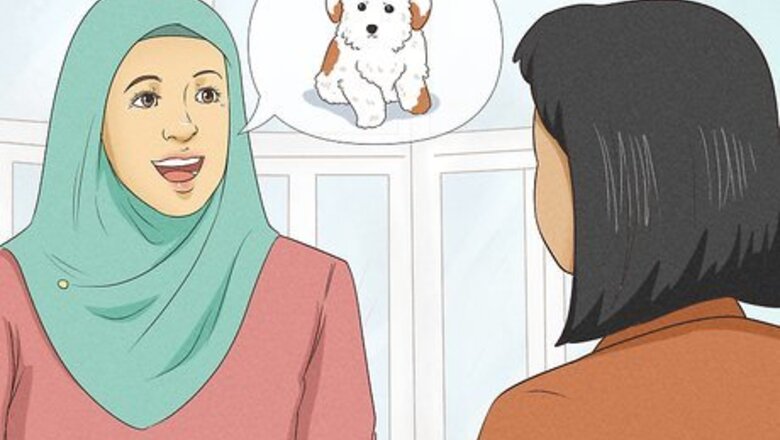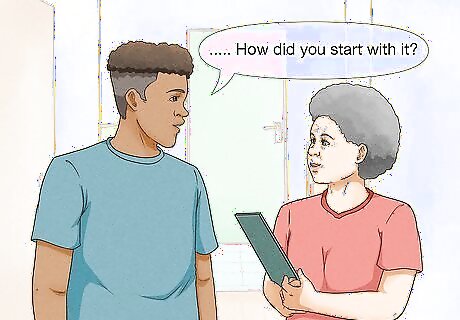
views
Think of topics to talk about ahead of time.

Come up with 2 to 3 things you feel comfortable chatting about. You don’t have to prepare a script, but try to make a short list of fun, easy conversation topics to fall back on. You could talk about your hobbies, your job, your travel plans, or your recent projects. Then, if you find yourself stumbling or the conversation is lulling, you can steer the topic toward something you feel comfortable talking about. For example, if you’re super into a new board game, you could ask the person you're talking to if they’ve ever played it. Or, if you just adopted a new pet, ask them if they have a dog and tell them about yours.
Act like you’re confident, even if you’re not.

Try to fake it until you make it. If you pretend like talking to new people or a group of strangers is no big deal, eventually, it will be! Hold your head up high and tell yourself that you aren’t nervous at all (because there’s no reason to be). Faking it until you make it takes time to work, so don’t get discouraged if it takes a few tries.
Maintain open body language.

Make eye contact and stand up straight. Let people know that you’re ready and willing to talk, even if you haven’t said much yet. You don’t have to keep eye contact 100% of the time, but it helps to glance up at the person you’re talking to every now and then. If you’re standing, try to plant your feet in a wide stance and roll your shoulders back to maintain good posture. Reader Poll: We asked 3954 wikiHow readers about the biggest tells that someone doesn’t want to talk to you, and only 6% said having a distant body position. [Take Poll] So, it can be okay to keep your distance, but definitely keep your body language open and relaxed so people know you’re interested in talking!
Smile at people to signal you’d like to talk.

Starting a conversation can be tough. If you want to chat with someone but you aren’t sure how to start, try catching their eye and smiling. If they get the message, they might just come over and start talking to you! This is a great tactic for parties or large group settings where it can be hard to get a word in edgewise.
Say something when there’s a pause in the conversation.

These lulls are your chance to get a word in. If the conversation stalls for more than a few seconds, you can say something related to the previous subject or something completely random. You can also find common ground that might provide a good opening remark, like similar interests in a certain type of music. The other person might also ask you questions to keep the conversation going.
Make brief, quick commentaries.

Start with small statements, noises, or exclamations. This works especially well in large group conversations where it’s tough to make extended statements anyway. Consider saying, “Yeah,” or, "You’re right," if you agree with someone. If you are not sure or are surprised, you might comment, “No way,” or, “Really?” In a group setting, even laughing counts as contributing. It also still signals to others that you are an active listener.
Raise your voice during group conversations.

Large, loud groups tend to be a little harder to interject yourself into. If you’re at a party or a gathering and you’re in a group setting, try to raise your voice to be heard over the other people or the music. Use gestures and open body language to make it clear that you’re speaking. During large, loud conversations, the rules of social engagement are slightly different. You may have to interject quickly after someone finishes talking so you get a chance, or you might have to raise your voice and continue talking if you start talking at the same time as someone else.
Compliment the other person.

Everyone likes to hear something good about themselves. A friendly compliment is a great way to start a conversation off on the right foot. You can compliment a total stranger or someone you know well. For example: “That’s a super cute purse, can I ask where you got it?” “Your costume looks amazing! Did you make it yourself?” “You really know your way around this area. Have you lived here long?”
Ask questions during a conversation.

Contribute by listening closely and asking follow-up questions. Try to ask open-ended questions rather than “yes” or “no” ones to keep the conversation going. Ask questions like: “That’s so interesting. What did you do next?” “How long have you lived in the area?” “What do you do now?”
Expand on things you have in common.

Take note of any similarities you have with your conversation partner. Ask follow-up questions or explain a little bit more about your interest in the subject. Before you know it, you’ll be having a fun, lively conversation. For example: “I didn’t know you were into skateboarding! I’ve been skateboarding since I was 14.” “You grew up in Florida, too? I lived there for 10 years.” “We live in the same neighborhood, how weird is that!”
Set a goal to talk every few minutes.

Give yourself a general rule to follow during conversations. Try saying something every 5 minutes (or more often if you feel like it). That way, you’ll keep up with the flow of the conversation and give some input about what you think. When you have a goal in mind, you’re less likely to get distracted by your own thoughts or daydream instead of actively listening.
Accept the silence if it happens occasionally.

Conversation lulls are going to happen, and that’s okay. Oftentimes, if you and your conversation partner just take a brief pause, one of you will come up with something to say. Try to stick with it, even if there are a few moments of silence every now and then. Sometimes, people will go quiet if they aren’t sure how to end the conversation. If you’ve been chatting for a few minutes and you feel like the conversation is over, feel free to wrap it up.
Practice talking more at home.

Hold conversations with your family, friends, and loved ones. The more you talk, the better you’ll get at it! If you can’t think of anything to say, pick out your favorite book and read it aloud as you pay attention to the tone of your voice and your pronunciation.




















Comments
0 comment